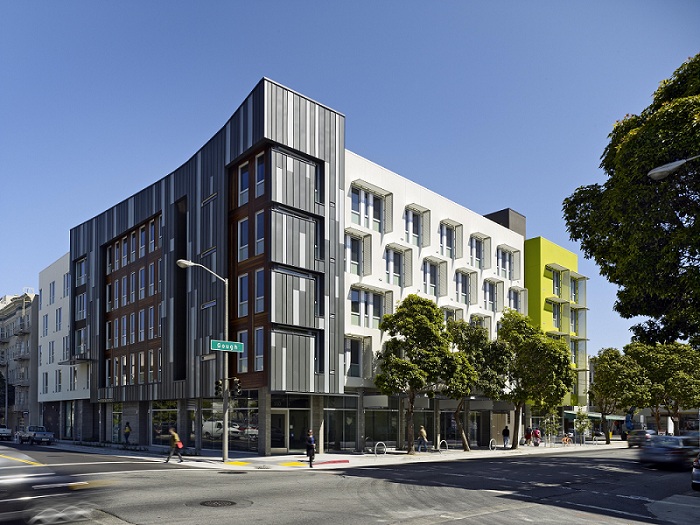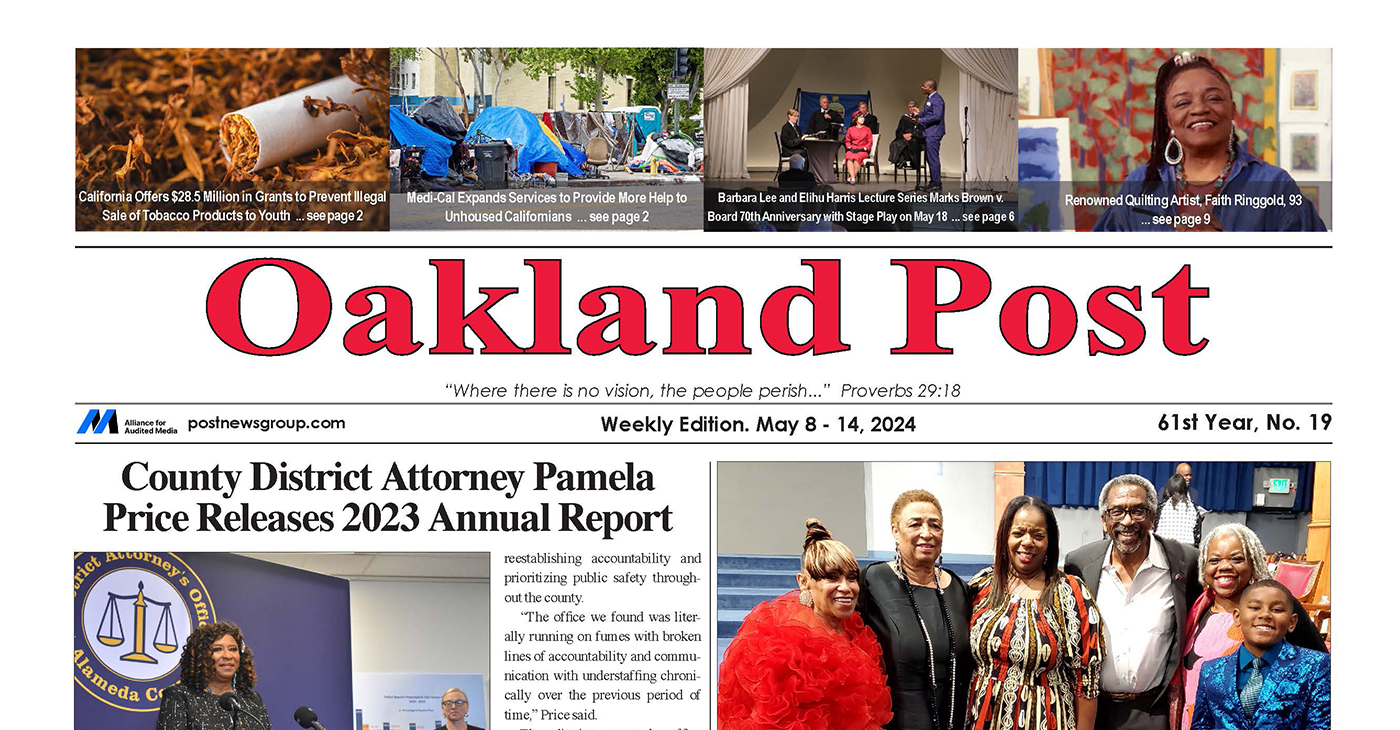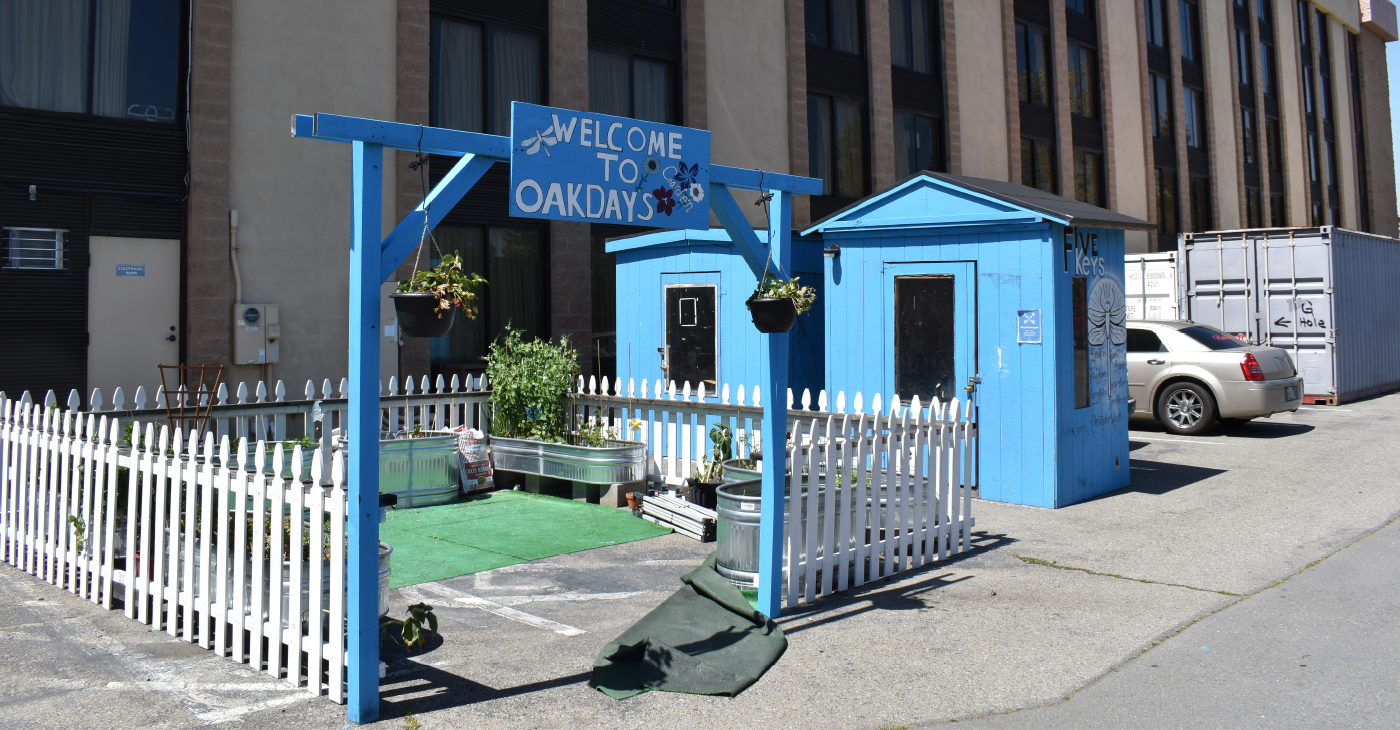Homeless
State Supported Housing Development Will Help Some Homeless but Beyond Reach for Many Oaklanders

Six affordable housing developers have been awarded a total of $30 million to build 413 housing units in Oakland, which will include 168 units of “permanent affordable housing” designed for the homeless and people with disabilities.
However, the other 345 units are classified as “affordable” for “low income households” require incomes from $75,000 to $99,000.
Most of these units are not connected to Project-Based Section 8 vouchers (PBVs) from the Oakland Housing Authority (OHA) that subsidizes the rents and will be beyond the reach of most Oakland residents who live below Highway 580, and earn on the average about $40,000 for a family of four.
The 168 units of permanent supportive housing will be built on a model that combines housing that is affordable to families and individuals experiencing homelessness with supportive services.
Supportive services can include case management, aid for those with physical disabilities, mental health assistance, and support with daily life activities. These units require Oakland Housing Authority Section 8 vouchers (PBVs) subsidies.
The six projects are:
- Fruitvale Studies with 24 units, including 15 units for the homeless, 12 PBVs, plus nine “affordable” units
- Brooklyn Basin (Project 3) with 130 units, 26 for the homeless, 65 PBVs, plus 104 “affordable” units
- Ancora Place with 77 units, 15 for the homeless, 31 PBVs and 62 “affordable” units
- 7th and Campbell with 79 units, 39 for the homeless, persons with disabilities and formerly incarcerated, 39 PBVs, plus 40 “affordable” units
- West Grand & Brush (Phase I) with 59 units, 30 for the homeless, persons with disabilities and vets, 28 PBVs, plus 29 “affordable” units
- Aurora apartments with 44 units, 43 for homeless and persons with special needs, 43 PBVs, plus one “affordable” unit
The six developments, which include a mix of new construction and rehabilitated buildings, are being funded through the State of California’s recently approved Proposition 2 — “No Place Like Home Program” – and the “Supportive Housing Multifamily Housing Program” – funded from Propositions 46 and 1C.
These developments are also funded by voter-approved Measure KK for affordable housing. Project completion date will vary from late 2019 through 2022.
“This is a great example of how city resources can leverage state funds to advance critical projects that will have a significant impact on our communities,” says Maraskeshia Smith, Interim Director of Housing & Community Development.
“These housing developments are incredibly important for addressing the needs of our most vulnerable populations,” noted Sara Bedford, Director of Human Services. “They are part of our overall strategy to address homelessness. Getting more projects like this funded and operational is critical to addressing this regional housing and homeless crisis.”
“However,” said James Vann of the Oakland Tenants Union, “without Oakland Housing Authority vouchers – which are in short supply – the housing will be out of the price range of most Oakland residents. A family of four would have to pay 60 percent of Alameda County Average Median Income (AMI), which would be an annual income of at least $74,340, well beyond Oakland families who earn about $40,000.”
According to the Oakland Housing Authority, currently, there are a total of 2,018 applicants remaining on the Section 8 wait list, which was last opened in 2011, and there are currently 228 voucher holders searching for units. The number of available Section 8 vouchers is limited by available federal funding.
Activism
Oakland Post: Week of May 8 – 14, 2024
The printed Weekly Edition of the Oakland Post: Week of May May 8 – 14, 2024

To enlarge your view of this issue, use the slider, magnifying glass icon or full page icon in the lower right corner of the browser window. ![]()
Bay Area
Mayor London Breed: State Awards San Francisco Over $37M for Affordable Housing
On April 30, Mayor London N. Breed announced San Francisco has been awarded more than $37.9 million in funding from the California Department of Housing and Community Development (HCD) as part of the State’s Multifamily Housing Program (MHP). The HCD loan will provide the final funding necessary for development of Casa Adelante – 1515 South Van Ness, a 168-unit affordable housing project located in San Francisco’s Mission District.

By Oakland Post Staff
On April 30, Mayor London N. Breed announced San Francisco has been awarded more than $37.9 million in funding from the California Department of Housing and Community Development (HCD) as part of the State’s Multifamily Housing Program (MHP).
The HCD loan will provide the final funding necessary for development of Casa Adelante – 1515 South Van Ness, a 168-unit affordable housing project located in San Francisco’s Mission District.
The new development at 1515 South Van Ness Ave. will provide 168 affordable homes to low-income families, formerly homeless families, and persons living with HIV earning between 25-80% of the San Francisco Area Median Income (AMI).
In addition, the project is anticipated to provide family-friendly amenities and ground floor community-serving commercial spaces that preserve the prevailing neighborhood character of the Calle 24 Latino Cultural District.
“This funding unlocks our ability to move on building affordable housing units for families in San Francisco at a crucial time. We understand the level of need for more housing that is accessible, and like the state, the city continues to face a challenging budget cycle,” said Breed. “1515 South Van Ness is a good example of what can be achieved in San Francisco when you have strong community partnerships and an unwavering commitment to deliver on critical needs for our residents.”
“From the beginning of my term as Supervisor, I have fought to bring affordable housing to 1515 South Van Ness” said Supervisor Hillary Ronen. “In the interim, the site has been utilized for homeless services and shelter, and I am thrilled that HCD has recognized the value of this development, and we are finally ready to break ground and bring 168 affordable homes to low income and formerly homeless families in the Mission.”
Owned and occupied by McMillan Electric Company until 2015, the City and County of San Francisco purchased 1515 South Van Ness Avenue in June 2019 with the intent of developing new affordable housing.
In November 2020, the San Francisco Mayor’s Office of Housing and Community Development (MOHCD) released a Multi-site Request for Qualifications (RFQ) seeking qualified developers to build affordable housing on the site, and subsequently selected Chinatown Community Development Corporation (CCDC) and Mission Economic Development Agency (MEDA) in May 2021 to develop the site.
The project is expected to begin construction in winter 2025.
“A strong, long-term push by Mission advocates to make this site 100% affordable is now paying off, with 168 family units that include services and childcare. People of color communities know what they need, and we are excited to be in partnership with a team, consisting of MEDA, CCDC, and MOHCD, that listens,” said Malcolm Yeung, Executive Director at CCDC.
“We are excited to be in partnership with CCDC, yet again, and for the opportunity to develop intergenerational affordable housing in the City’s Mission District,” said Luis Granados, executive director at MEDA.
Increasing housing affordable to lower-income and vulnerable residents is a key priority in the City’s Housing Element which calls for additional funding for affordable housing production and preservation, as well as Mayor Breed’s Housing for All Executive Directive that sets out the steps the City will take to meet the bold goal of allowing for 82,000 new homes to be built over the next eight years.
Tuesday’s funding announcement emphasizes the importance of regional and state collaboration in order to reach our housing and climate goals.
“We are thrilled—not just to bring a project of this size to a community with great need — but to do so with community-based developers and their partners who understand the neighborhood and sensitivities around cultural preservation,” said HCD Director Gustavo Velasquez.
Alameda County
An Oakland Homeless Shelter Is Showing How a Housing and Healthcare First Approach Can Work: Part 1
Hundreds of tents and abandoned vehicles now dot major streets and neighborhoods of the Bay Area. Unfortunately, this problem is expected to worsen as the housing market skyrockets and the cost of living becomes unattainable for most Americans.

By Magaly Muñoz
Hundreds of tents and abandoned vehicles now dot major streets and neighborhoods of the Bay Area. Unfortunately, this problem is expected to worsen as the housing market skyrockets and the cost of living becomes unattainable for most Americans.
As one of California’s biggest public policy challenges, over the past four years, the state has allocated nearly $20 billion to housing and homelessness initiatives. Despite this substantial investment, the issue does not seem to be easing. Instead, the number of people without stable housing is surging.
A 2022 Point In Time (PIT) Count showed that there were 9,747 homeless individuals living on the streets in Alameda County, an almost 22% increase from the 2019 count of 8,022 homeless individuals. Many reports estimate that this number will rise once the 2024 data is released.
Amongst the many initiatives to end homelessness, the 2016 Senate Bill 1380 established California as a “housing first” state that would provide assistance, programs and funding to those experiencing homelessness. The bill recognized that the evidence-based model of prioritizing housing could end all types of homelessness and is the most effective approach to ending chronic homelessness.
In the years following the passage of the law, doctors, county officials and a community organization came together to create a first of its kind shelter to combat homelessness with housing and healthcare: the Oak Days shelter. Located in the Hegenberger corridor of Oakland, this facility, once a Days Hotel, now houses 60 individuals, some who are medically fragile.
As local counties navigated how to isolate people during the start of the COVID-19 pandemic in 2020, the state obtained federal funding to begin Project Roomkey, an initiative providing non-congregate shelter options, such as hotels and motels for people experiencing homelessness, to protect life and minimize strain on the healthcare system.
Dr. Alexis Chettiar, a medical director in Alameda County, witnessed firsthand how the coronavirus disease took over the lives of the most vulnerable populations who were too sick to remain stable unless they had hands-on supportive health care and permanent housing.
She also noticed a trend of medically vulnerable individuals with psychiatric illnesses or substance abuse issues being expelled from nursing homes, often ending up in encampments or unsheltered conditions.
This observation would inspire her, along with fellow medical director Catherine Hayes, to start Cardea Health, supported by county funding.
“What we really wanted to do was to be able to layer on the medical services to a permanent supportive housing environment so that people could age in place, they could stay there, no matter how their care needs change over time. They could stay there through the end of their life,” Chettiar said.
Cardea Health provides medical and personal care for almost 60 patients across two sites. One of these sites is an Old Comfort Inn that was also transformed into a shelter for those experiencing homelessness and chronic illnesses. The medical team assists with tasks such as injecting insulin, administering dialysis, helping patients use the restroom or get dressed.
Chettiar shared that she’s seen people as young as 40 years old with health-related issues mimicking that of an 80-year-old. Some individuals had untreated wounds that led to infections or chronic illnesses that went untreated for years, leading to immense suffering before they were able to receive medical attention.
The harsh conditions of living on the streets have exacerbated what could’ve been manageable situations, into a full-blown health crisis that ultimately put them on the priority list for Cardea’s health assistance.
UCSF Benioff Homelessness and Housing Initiative conducted a survey of 3,200 people to study who is experiencing homelessness, how they became homeless, what their experiences are and what is preventing them from exiting homelessness.
Data from those surveys showed that 45% of those experiencing homelessness reported poor or fair health and 60% reported having a chronic illness. Participants also reported that being homeless worsened their physical and mental health.
Of those experiencing health problems, 23% couldn’t access necessary healthcare in the prior six months. Additionally, 38% visited emergency departments without hospitalization and 21% reported a hospitalization for a physical health concern.
Chettiar stated that the work at Cardea is intended to reduce hospital visits for those living on the streets, providing essential care where it’s needed most.
-

 City Government2 weeks ago
City Government2 weeks agoCourt Throws Out Law That Allowed Californians to Build Duplexes, Triplexes and RDUs on Their Properties
-

 Community4 weeks ago
Community4 weeks agoFinancial Assistance Bill for Descendants of Enslaved Persons to Help Them Purchase, Own, or Maintain a Home
-

 Activism3 weeks ago
Activism3 weeks agoOakland Post: Week of April 24 – 30, 2024
-

 Business4 weeks ago
Business4 weeks agoV.P. Kamala Harris: Americans With Criminal Records Will Soon Be Eligible for SBA Loans
-

 Community4 weeks ago
Community4 weeks agoOakland WNBA Player to be Inducted Into Hall of Fame
-

 Community4 weeks ago
Community4 weeks agoAG Bonta Says Oakland School Leaders Should Comply with State Laws to Avoid ‘Disparate Harm’ When Closing or Merging Schools
-

 Community4 weeks ago
Community4 weeks agoRichmond Nonprofit Helps Ex-Felons Get Back on Their Feet
-

 Community4 weeks ago
Community4 weeks agoRPAL to Rename Technology Center for Retired Police Captain Arthur Lee Johnson










































